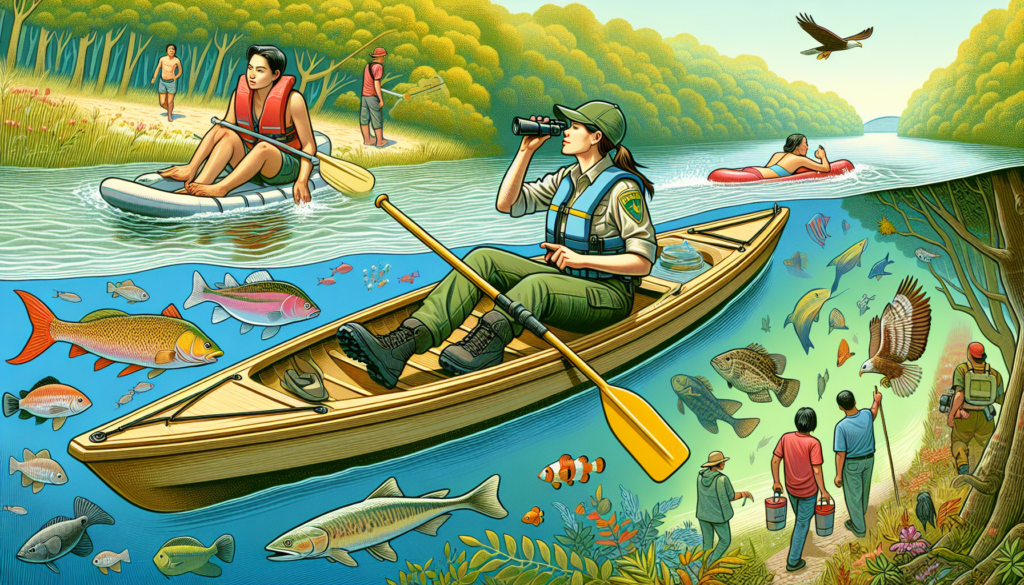Imagine splashing through a crystal clear river, surrounded by the raw beauty of nature, without causing any harm to the surrounding ecosystem. That’s the dream, right? This is what “Maintaining Ecosystem Integrity While Enjoying Water Recreation” discusses. It’s about acknowledging your love for water activities, like swimming, fishing, kayaking or even snorkeling, and understanding how you can enjoy these pastimes without harming our environment. So, brace yourself to strike that tricky balance – respecting and preserving nature while indulging in your favorite water-based recreational activities. And remember, how you treat the environment is as crucial as how you enjoy it.

Understanding Ecosystem Integrity
Definition of Ecosystem Integrity
To understand ecosystem integrity, you first need to comprehend what an ecosystem is. It’s a community of all the living organisms present, including plants, animals, and microorganisms, along with their non-living environment, in a particular natural setting. Your local river, the nearby forest, even the pot of soil housing your indoor plant, each one is an example of an ecosystem. Now, ecosystem integrity denotes the completeness of an ecosystem. It suggests an unlittered, sound, and robust ecosystem, characterized by the absence of exploitation from external human influences and dominated by native species.
Importance of Preserving Ecosystem Integrity while Enjoying Water Recreation
The lure of water-based recreational activities is irresistible, isn’t it? Boating, swimming, fishing, these activities make for a perfect holiday. Yet, each of them has the potential to interfere with the natural balance of the water bodies and harm their ecosystem integrity. Preserving the ecosystem while relishing these recreations is essential, otherwise, we risk disrupting the delicate equilibrium of these water bodies. This might result in diminishing biodiversity, erosion of the natural landscape, and even severe health issues for us humans due to polluted water. In essence, for both environmental and human wellness, maintaining the integrity of these aquatic ecosystems is paramount.
Various Forms of Water Recreation
Inland Water-Based Activities
Inland water-based activities, though seemingly harmless, can oftentimes disturb the natural ecosystem. Every leisurely canoe ride on the local pond, every adventurous white water rafting trip on the nearby river may unintentionally cause harm. These serene water bodies are homes to numerous animal and plant species. Unintentionally, while enjoying, we might disrupt their homes or worse, their natural behaviour patterns.
Coastal and Oceanic Activities
Coastal and oceanic activities such as surfing, diving, or simply frolicking on the beach also play roles in shaping the aquatic ecosystem. These activities often lead to trampling of beach vegetation, disturbance to nesting and feeding animals, and pollution from discarded waste. Even though the ocean seems vast and invincible, our combined recreational actions often leave a significant, and sadly, quite destructive footprint.
Recreational Fishing and its Impacts
Recreational fishing, one of the most popular water recreations, usually portrays the tranquil bonding between nature and humans. However, this seemingly harmless activity may unintentionally lead to overfishing, habitat destruction, and alteration in the natural behavior of aquatic species. Therefore, embracing sustainable fishing practices is crucial, to enjoy this recreation without hampering the ecosystem.
Recreational Impacts on Aquatic Ecosystem
Physical Disturbances
Even though water bodies seem indestructible, our recreational activities often result in physical disturbances in these natural habitats. Propeller scars from leisure boats, trampling of creek beds during a swimming trip, even the innocent steps treading the beach vegetation during a beach holiday can contribute to these disturbances.
Pollution and Waste Discard
Unfortunately, water bodies often bear the brunt of our revelling. Abandoned fishing gears, plastic wrappers, or even an accidental oil spill from a jet ski, they all accumulate to form an astounding amount of pollution. These discarded wastes greatly affect the health and wellbeing of the aquatic fauna.
Alteration in Aquatic Fauna Behavior Patterns
The boisterous jet ski ripping through the calm sea, the gleeful screams of children invasive in the quiet river bend, or the fishing lure seducing the fish, they all can lead to alteration in the natural behaviour patterns of aquatic life. The recreational noises and activities might deter aquatic fauna from their customary feeding and mating patterns leading to detrimental consequences on their population.
Responsible Boating
Proper Waste Disposal
While boating, the importance of managing your waste properly can’t be stressed enough. Overboard littering can seriously harm aquatic life and degrade water quality. Therefore, always ensure to collect your refuse in a bag and dispose of it responsibly in allocated areas on the shore.
Minimized Fuel Spill
Ensuring minimal fuel spills while refilling or during boating is pivotal. These spills contaminate the water, reducing water quality and hampering the health of the aquatic creatures. Good boating practices and routine maintenance checks can help prevent accidental spills.
Avoidance of Sensitive Habitats
Avoidance of sensitive aquatic habitats should be integral to your boating conduct. These might be the breeding grounds or home to endangered species. Boating in these areas may disturb these delicate species or even damage these habitats.

Sustainable Fishing Practices
Catch and Release
A practice which allows you to enjoy fishing and mitigate potential harm is ‘Catch and Release’, where you immediately release the fish back into the water after catching them. This principle assures that you are not contributing to overfishing or depletion of the fish population.
Respecting Fishing Seasons
Regulated fishing seasons are established for a reason. These seasons typically align with the breeding cycle of the fish and therefore aid in protecting and maintaining a healthy fish population. So, always ensure to abide by these regulations.
Use of Environmental-Friendly Fishing Gear
Choosing environmental-friendly fishing gear helps reduce waste and damage to aquatic habitats. Non-toxic gear and weights, biodegradable fishing line, correct disposal of gear, they can all aid in reducing the impact of recreational fishing on aquatic ecosystems.
Educating and Informing Recreational Users
Importance of Awareness Programs
Did you ever wonder how powerful your role as a recreational user is in preserving the aquatic ecosystem? Awareness programs that educate about responsible practices, its significance, and the ecological implications of ignorance, can transform you into an informed and conscious recreational user.
Role of Community Initiatives
Community initiatives such as local cleanup drives, group training on responsible recreation can greatly contribute towards this. These initiatives not only educate, they empower with a sense of collective responsibility and stewardship for the local natural resources.
Leveraging Technology for Information Dissemination
With the global reliance on technology, this can be harnessed as an effective platform for information dissemination. Apps and websites featuring guidelines on environmental sustainability, live forums for discussion, even virtual tutorials can shape you into a responsible recreational user.
Legal and Regulatory Framework
Existing Laws for Protection of Aquatic Ecosystems
There are several laws and regulations in place worldwide to safeguard our precious aquatic ecosystems. These prescribe the manner and periods of fishing, designated areas for boating, standards for pollutant discharges, and many such directives. Adherence to these laws is not only legally binding, but it is also an ethical responsibility towards the environment.
Role of Enforcement Agencies
Various enforcement agencies play crucial roles in implementing these laws. They conduct regular monitoring, carry out inspections of compliance, and perform overall supervision of recreational activities. Their diligent efforts ensure the protection and sustainability of the aquatic resources.
Potential Penalties for Non-compliance
Non-compliance with these laws can entail sizable penalties. These may range from monetary fines to revocation of permits, even imprisonment in serious offences. More than the fear of these deterrents, one should instill the awareness and respect for these safety measures as they are in place to safeguard our natural treasures.
Ecotourism and Its Role
Definition and Principles of Ecotourism
Ecotourism, considered a sustainable alternative to mass tourism, focuses on making minimal impact, promoting awareness of the environment, respecting the local culture, providing direct financial benefits to conservation, and empowering local communities. It merges relaxation with sustainability and encourages interactions with nature, that are responsible, educational, and conserving.
Effect of Ecotourism on Aquatic Ecosystems
The principles of ecotourism allow for recreational activities that are both enjoyable and enabling in maintaining the ecosystem integrity. From dolphin watching tours that adhere to safety distances to snorkeling trips ensuring coral safety, ecotourism practices help in diminishing the adverse effects of recreational water activities on aquatic ecosystems.
Ecotourism as an Alternative Method of Water Recreation
As recreational users, you can contribute to sustainable practices by opting for ecotouristic activities. These activities not only respect the ecosystem’s integrity but also intimate you with fine nuances of the aquatic world. They promote environment-friendly practices, prioritize community welfare, and add tremendously to conservation efforts.
Initiatives by Public and Private Sectors
Conservation Projects
Numerous public and private entities undertake conservation projects to maintain the health and integrity of the aquatic ecosystems. These include habitat restoration initiatives, biodiversity conservation projects, pollution control projects, and many more. These efforts pave the way for sustainable enjoyment of water bodies and provide a safe environment for the local plant and animal life.
Recreational Guidelines and Regulations
Guidelines and restrictions related to water recreation are an essential step associated with conservational aspects. By complying with the laid down rules about permitted recreational activities, specific time durations, assigned zones, and many more, you aid in the efforts to minimize negative impact on the ecosystems.
Education and Awareness Campaigns
Government bodies, eco-organizations, and private clubs often run education and awareness campaigns to promote responsible behaviour towards aquatic ecosystems. They inform about the do’s and don’ts, share updates about new laws and penalties, and educate about the science of the ecosystem and importance of responsible enjoyment.
Conclusion: Balancing Recreation and Conservation
The Necessity for Sustainable Practices
Water recreation is a refreshing and joyous way to bond with nature. But, maintaining a balance between this recreation and conservation is a necessity. By implementing sustainable practices, we protect the health and integrity of these ecosystems, ensuring they remain a source of enjoyment for future generations.
Transforming Recreation into a Tool for Conservation
Transforming our recreational activities into a tool for conservation is a mission we should all embrace. By being mindful and responsible in our activities, we not only protect our natural resources, but we also set an impactful precedent for future generations. Conservation thus becomes a collective, ongoing effort that celebrates nature and our connection to it.
Future Prospects for Sustainable Water Recreation
The future of sustainable water recreation is full of promise. As awareness grows and the number of initiatives multiply, our hope is that sustainable practices will be the norm rather than the exception. With each passing day, with each responsible act, we come closer to this vision: where water recreation serves the dual purpose of enjoyment and conservation. And that is indeed a future worth striving for.


[…] threat, looming from the propellers of your boat. In ‘Balancing Wins and Wildlife: Navigating protected waters While Boating’, you’ll explore the fine line between appreciating the waters through […]
[…] It’s a comprehensive guide that helps you harmonize your boating activities with nature, maintaining the integrity and beauty of our water bodies. Read on, and learn how you can become an environmentally conscious sailor. Remember: you can make […]